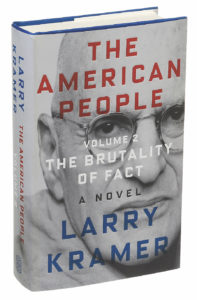There is much sex but little love in the first volume of writer and activist Larry Kramer’s The American People, subtitled Search for My Heart. It contains episodes of imagined and hypothetical gay sex throughout early America (so many penises, so little time). In addition to writing about George Washington, Alexander Hamilton, Abraham Lincoln, Walt Whitman, and legions of nameless “hushmarkeds” (or homosexuals), Kramer chronicled the beginnings and sexual awakening of Fred Lemish, his avatar. Like Kramer, Fred attends Yale and comes of age as a gay man after World War II. HIV may not have been anywhere in sight, but unspecified contagion appears in the form of “The Underlying Condition” periodically throughout.

Instead of graphic details of gay couplings, Volume 2 of The American People, subtitled The Brutality of Fact, contains intimate descriptions of Kaposi’s sarcoma, pooling diarrhea, projectile vomiting, blindness, and organ transplants. And there is love. It’s a long time coming (pun intended). In the midst of battling AIDS, Fred finds himself in the arms of Felix, a closeted reporter for the New York Truth (Kramer’s stand-in for the New York Times). Readers familiar with The Normal Heart will recognize the character of Felix from Kramer’s groundbreaking play, which first dramatized political conflicts and personal tragedies in the early years of the spread of HIV. After making love with Fred — and not just having sex — Felix remarks that “men do not just naturally not love, they learn not to.” It is a strikingly earnest and tender observation in the form of a double negative from a writer who has taken pains to mask nearly every emotion save anger and despair. Fred’s lover dies in the viral holocaust, but before he does Felix admonishes Fred to stay angry and keep writing and fighting.
Kramer has much to be angry about. At 84, he has survived a plague that decimated a generation of American gay men and claimed the lives of an estimated 32 million people worldwide. After becoming an accomplished screenwriter in Hollywood — his adaptation of D.H. Lawrence’s Women in Love earned him an Oscar nomination — then gaining notoriety with his novel Faggots, Kramer spent decades organizing the Gay Men’s Health Crisis and, later, ACT UP, to demand and deliver effective, affordable treatment. It was clear to Kramer in the early years of the pandemic that promiscuous sex between men was allowing the virus to spread, and he was quick to call for an end to risky behavior. Some activists interpreted his admonitions as homophobic, but Kramer resorted to increasingly confrontational and polarizing tactics. He was particularly outraged by the silence of New York Mayor Ed Koch, named Kermit Goins in The Brutality of Fact, whom he asserted was gay and closeted. Fueled by a long memory and formidable fury, Kramer has taken every opportunity in Volume 2 to say “I told you so.”
Kramer uses much of the second volume to pillory those who thwarted efforts to identify HIV and stop its spread. He invents names to disguise their identities. Some are so silly as to be distracting: Manny Moose for Edwin Meese, Purpura Ruester for Nancy Reagan, Dred Trish for George Bush, Jean-Paul Fatoottst for French theorist Paul-Michel Foucault. Other names and acronyms bring knowing laughter: ZAP for the punishing and ineffective drug AZT, FUQU (Fed Up Queers United) for ACT UP, and Cardinal Bernard Buggaro for Bernard Francis Law, who oversaw Boston’s Catholic archdiocese and helped cover up the church’s sex abuse scandal. Without a working knowledge of the ’80s and ’90s (and access to Google), it may be tough for readers to connect Kramer’s allusions to actual historical figures and events, taking some of the fun — and sting — out of the rolling lampoon. Tough, also, to dive into Volume 2 without having at least skimmed Volume 1. Volume 2 just takes off, with an author’s note explaining that the first volume ended abruptly because the author “was taken to the hospital to die.” This is likely the truth, but it does little to ready readers for the wild ride that is The Brutality of Fact.
Despite the second volume’s title, Kramer is only intermittently concerned with historical veracity. He uses words from Herman Melville’s Moby-Dick as one of the many epigrams at the beginning of Volume 1: “It is not down on any map; true places never are.” The approach shapes Volume 2 as well. Some things clearly happened, but Kramer is more interested in imagined conversations and conspiracy-fueled conjectures than he is with careful documentation. What are the connections between the CIA, Big Pharma, French researchers, and the Yale Corporation? Kramer is more than happy to imagine stealth and machinations. When Congress votes to block funding for any programs related to “homosexual activities,” an unnamed narrator remarks that the “distinction between fact and fiction, true and false, no longer exists.” As a history, the book is a strange creature, with no mentions of Vietnam, for instance, not even in its relationship to gay men’s experiences. Fred — and Kramer — might well counter that standard American histories omit the merest mention of gays, and few call these works into question.

Kramer — through Fred — admits that he knows the book is a challenge to readers. “I’ve worked on this fucking book for many years,” Fred muses. “It’s a mess and I know it’s a mess.” What must editors have made of the episodic manuscript, which shifts voice and perspective without much warning and veers in form from prose narrative to clunkily dialogued screenplay? Did they suggest that Kramer even try to bring humanity to his sexually active female characters? Did they cut any of the leaden and clichéd prose? Perhaps they feared Kramer’s impressive wrath. Or perhaps they concluded that having waged such critical battles and survived to tell so many tales, Kramer has earned the right to write what and how he wishes.
“It’s been a long history, hasn’t it?” Fred asks near the end of the book. “How enlightened do you feel? Do you hear the voices of the dead as I still do?” Not exactly a history or a novel, and not quite a memoir, the second volume of Kramer’s magnum opus summons times and voices from the depths of America’s plague years. A tale of persistence, disease, and love, it deserves to be reckoned with on Kramer’s own terms.



